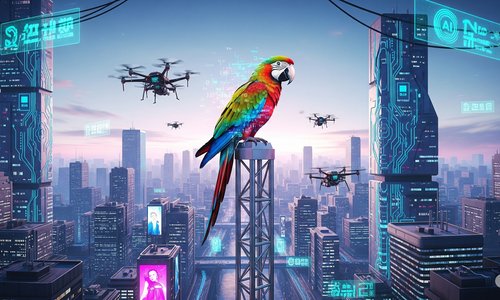
A Promessa e o Perigo da Nova Revolução Digital
A nova corrida tecnológica global levanta uma pergunta urgente: estamos prontos para confiar na inteligência que criamos?

Entenda como a performance, a democratização e a complexidade dos modelos de IA estão revolucionando nosso mundo, sem trazer obrigatoriamente o fim dos tempos.
Há séculos, o imaginário humano tem construído histórias do fim do mundo e eventos apocalípticos. A Bíblia, um dos conjuntos de livros mais antigos, possui um livro específico sobre o tema. Nos cinemas, entre alienígenas, zumbis e vírus mutantes, encontramos também a Inteligência Artificial (IA) e os robôs entre os responsáveis costumazes pelo Armagedom. A mídia e a cultura pop contribuem para que muita gente veja a IA como uma ameaça à humanidade.
Mas, na verdade, grande parte do medo em relação à Inteligência Artificial vem do desconhecimento e da falta de informação. O ser humano teme o desconhecido, e quando falamos de tecnologias emergentes como a IA, é natural que haja receio. Uma das melhores formas de enfrentar esse medo é buscar entender melhor como essas tecnologias funcionam e qual o seu impacto em nossas vidas.
É impossível negar o avanço tecnológico das tecnologias de Inteligência Artificial. Elas estão presentes em muitos aspectos do nosso dia a dia. Nos deslocamos em grandes cidades usando algoritmos logísticos de IA, escolhemos filmes e produtos através de algoritmos de recomendação, validamos acessos com algoritmos biométricos, analisamos imagens e diagnosticamos doenças, interagimos com agentes conversacionais como Chatbots e passamos horas consumindo conteúdos de redes sociais direcionados por algoritmos. A IA já é quase onipresente em nossas vidas.
Porém, ao contrário das visões apocalípticas, a Inteligência Artificial tem proporcionado incontáveis benefícios à sociedade. A IA tem sido usada para melhorar a eficiência de processos, solucionar problemas complexos, apoiar a medicina e pesquisas científicas, além de facilitar a comunicação e o acesso à informação. Enquanto é importante ter consciência dos possíveis riscos e desafios associados à IA, também é crucial reconhecer seu potencial de transformação positiva.
AI Hype: Performance, Democratização e Incompreensão
Em 2023, a Inteligência Artificial vive um grande hype, e isso se deve às recentes inovações tecnológicas que impactam diretamente o campo da IA. Dentre essas inovações, destacam-se os Modelos de Linguagem de Grande Escala (LLM), como o ChatGPT, que têm revolucionado a forma como nos comunicamos com as máquinas, e os avanços na IA Generativa, que possibilitam a criação de conteúdo inovador e personalizado.
Essas tecnologias emergentes estão moldando o cenário atual, amplificando o efeito de três aspectos fundamentais: a crescente performance da IA, a democratização do acesso a essas tecnologias e a incapacidade de compreensão humana dos modelos mais avançados. Neste contexto, é fundamental explorar cada um desses fatores em detalhes, a fim de compreender a influência das inovações tecnológicas no universo da IA e em nossas vidas.
Novos patamares de performance
Quando falamos de performance em IA, os Modelos de Linguagem de Grande Escala (LLM), como o ChatGPT, têm alcançado novos patamares de eficiência e precisão. Esses modelos são capazes de compreender e gerar textos com alto grau de coesão e coerência, tornando a interação entre humanos e máquinas cada vez mais natural. Além disso, a IA Generativa, como as Redes Adversariais Generativas (GAN) e os Modelos Generativos de Difusão Preditiva (DDPM), tem revolucionado a criação de imagens e vídeos realísticos, enquanto a Neural Radiance Fields (NeRF) tem permitido reconstruções 3D impressionantes a partir de fotos 2D.
No entanto, a crescente performance da IA também traz preocupações quanto aos possíveis riscos e usos indevidos dessas tecnologias. Por exemplo, os LLMs podem ser utilizados para gerar desinformação e manipular a opinião pública, enquanto a IA Generativa, como GANs e DDPMs, pode ser empregada na criação de imagens e vídeos falsos, os chamados deepfakes, que podem causar danos à reputação e segurança de indivíduos e organizações. Diante dessas ameaças, é crucial estabelecer mecanismos de controle e responsabilização para evitar o uso mal-intencionado dessas tecnologias.
Inteligência Artificial para Todos
A democratização do acesso às tecnologias de IA é outro ponto crucial, especialmente para o público leigo. As interfaces de chatbot, por exemplo, têm simplificado a utilização de Modelos de Linguagem de Grande Escala, tornando a interação com esses sistemas mais acessível e amigável para todos os usuários. Além disso, com a popularização de serviços e plataformas baseadas em SaaS (Software como Serviço) e APIs, os custos para usar tecnologias de IA têm se tornado cada vez mais acessíveis. Isso permite que um público mais amplo possa se beneficiar dessas inovações, mesmo sem conhecimentos técnicos avançados.
Embora a democratização do acesso à IA seja benéfica para muitos, também há preocupações quanto ao uso irresponsável e não supervisionado dessas tecnologias. Com ferramentas e plataformas mais acessíveis, indivíduos mal-intencionados podem utilizar IA para fins nefastos, como ciberataques, invasões de privacidade e até mesmo vigilância invasiva. Portanto, é importante garantir que o acesso democratizado à IA seja acompanhado por medidas de segurança e regulamentações que ajudem a prevenir abusos e proteger os usuários.
Decisões Caixas-Pretas
Por outro lado, a incapacidade de compreensão humana dos modelos mais avançados de IA, como os baseados em Deep Learning, representa um desafio. Esses modelos, muitas vezes chamados de "caixas-pretas", são complexos e de difícil interpretação, o que pode dificultar a identificação de possíveis vieses e falhas. A pesquisa em XAI, que focam em aspectos como explicabilidade e interpretabilidade de IA, busca abordar essa questão, a fim de tornar os modelos mais transparentes e compreensíveis para os humanos.
Por fim, a incapacidade de compreensão humana dos modelos mais avançados de IA pode levar a situações em que as máquinas tomem decisões sem que possamos entender completamente os motivos por trás dessas escolhas. Isso pode resultar em decisões enviesadas ou injustas, com impactos negativos em áreas sensíveis como finanças, saúde e justiça. Além disso, a crescente autonomia das IAs também pode gerar preocupações quanto à possibilidade de perda de controle humano sobre essas tecnologias, com consequências imprevisíveis. Assim, é fundamental que os pesquisadores e profissionais da área continuem trabalhando na compreensão e aperfeiçoamento dos modelos de IA, garantindo que as máquinas trabalhem em conjunto com os seres humanos, respeitando nossos valores e princípios éticos.
Um caminho a trilhar
Em vez de temer um apocalipse causado pela IA, precisamos nos concentrar em compreender essas tecnologias e garantir que elas sejam usadas de maneira responsável e ética. Os avanços na Inteligência Artificial têm o potencial de melhorar nossa qualidade de vida, aumentar a eficiência em diversos setores e abrir portas para inovações incríveis. No entanto, é fundamental que sejamos conscientes dos desafios e trabalhemos juntos para enfrentá-los.
Há uma importante jornada de governança pela frente, na qual devemos unir esforços para construir um futuro promissor, aproveitando ao máximo as potencialidades das tecnologias de IA na resolução de problemas intrincados e complexos como a fome, a degradação ambiental, o bem-estar social, entre outros Objetivos de Desenvolvimento Sustentável (ODSs) ainda distantes de serem alcançados. Essa responsabilidade não se restringe apenas aos governos, mas constitui uma agenda que envolve toda a sociedade, incluindo empresas, organizações não-governamentais, acadêmicos e cidadãos comuns.
A Inteligência Artificial não é necessariamente um vilão apocalíptico à espreita, mas sim uma ferramenta poderosa que, se usada corretamente, pode nos ajudar a superar obstáculos e criar um futuro mais próspero e sustentável. Entender e explorar essas tecnologias nos permitirá dissipar o medo e focar no verdadeiro potencial da IA para transformar positivamente nossas vidas.
Alexandre Del Rey
Conselheiro fundador da I2AI – Associação Internacional de Inteligência Artificial. Também é sócio-fundador da Engrama, sócio da Startup Egronn, e na consultoria Advance e investidor na startup Agrointeli . Tem mais de 20 anos de experiência em multinacionais como Siemens, Eaton e Voith, com vivência em países e culturas tão diversas como Estados Unidos, Alemanha e China.
Palestrante internacional, professor, pesquisador, autor, empreendedor serial, e amante de tecnologia. É apaixonado pelo os temas de Estratégia, Inteligência Competitiva e Inovação.
É Doutor em Gestão da Inovação e Mestre em Redes Bayesianas (abordagem de IA) pela FEA-USP. É pós-graduado em Administração pela FGV e graduado em Engenharia Mecânica pela Unicamp.

A nova corrida tecnológica global levanta uma pergunta urgente: estamos prontos para confiar na inteligência que criamos?

Por que dominar a IA será a nova alfabetização do século XXI

Conselhos de Administração devem evoluir da supervisão reativa para a antecipação estratégica, frente à crescente complexidade e volatilidade dos ambientes de negócios.

De 14 a 25 de julho, reserve suas manhãs das 08h00 às 09h30 para participar da tradicional Maratona I2AI! Uma jornada intensa com debates e palestras sobre temas essenciais: Ética,